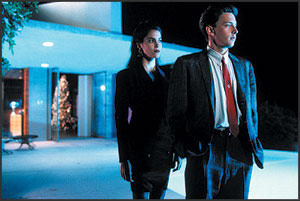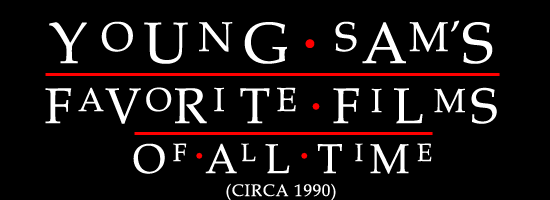No. 11: LESS THAN ZERO

Reviewed by Sam Hatch
AS THIS IS PART OF A RETRO NOSTALGIA BINGE AS OPPOSED TO A TRADITIONAL REVIEW, THERE MAY BE SPOILERS PRESENT IN THE TEXT.
Another film I named my metal band after, yet skipped in the theaters. At this age I was still mostly going to the movies with my parents, and at the time this was released we went to see The Running Man instead. I was getting more into certain dramas, but it wasn't until it appeared on cable that I became entranced by this adaptation of American Psycho penner Bret Easton Ellis' novel about privileged LA kids wrapped up in sex and drugs.
Firstly, I fell in love with the mood, and this is one moody picture. Andrew McCarthy plays the (moody) college student Clay Easton, who comes back West for Christmas break to discover that his two best friends' lives have fallen apart in his absence. Jami Gertz as ex-girlfriend/damaged goods model Blair, and Robert Downey, Jr. as the charming junkie Julian complete the triad, and Clay is still stinging over the fact that his woman was so quickly bedded by his best buddy while he was going to school in New Hampshire. These revelations are artily revealed through black and white flashbacks while Angsty-boy is traveling back home.
He attends their parties with a wounded, distant affectation, discovering that old classmate Rip (the always great James Spader) has turned to fulltime drug dealing/pimping and that Julian is now his number one client. Walls of TVs form a gateway to the party, and are supposed to comment on the vapid excesses of these rich brats and that LA culture corrupts absolutely, but damned if I didn't want to throw a TV-walled party just like the one in the movie. Apparently Clay's character was much more of a bastard in the novel, but I can't argue with the decision by screenwriter Harley Peyton(Twin Peaks) to cast him in a more sympathetic light. He is still spoiled rotten, but he floats slightly above the events of the film, trying to keep the insanity at an arm's length.
The film was directed by relative unknown Marek Kanievska, but the cinematography by Edward Lachman was gobsmackingly beautiful (gotta love the blue-drenched poolside scenes), the sex was hot (McCarthy gets Gertz' heels in the air as he pounds her against a wall in a vineyard), and the soundtrack was awesome (Hendrix, the Cult, Danzig, and a great remake of Hazy Shade of Winter by the Bangles). I wasn't into the drug culture, but I had a friend at the time that sadly reminded me of Julian. So I was very much tapped into this film emotionally. Plus I was in my angsty Hamlet-reading era, so although I had not been cheated on like Clay, I still walked around most of the time feeling like Andrew McCarthy in this film. If only I had his cool vintage Corvette instead of my Plymouth Satellite.
Even if it wasn't intended by Ellis' original exposé of the lives of drug-addled rich kids, I now can also appreciate it for its commentary on the post-high school experience, and how people experience emotional puberty at that point and squirm around in a vain effort to figure out who they really are. Clay's loss of his friend Julian is also his way of shedding his juvenile past and finally taking steps into adulthood.
It's hard not to be fascinated by Robert Downey Jr's performance as Julian, as it so closely mirrors his own tabloid-ridden life. The depths of addiction are detailed without squeamishness (the notorious c-sucking scene springs to mind), and even though you want to believe Julian when he tries to worm money out of his uncle (ostensibly for a nightclub venture), it breaks your heart to ultimately side with his family when they are forced to shun him.
There were plenty of 'drugs are bad' films in the 80s, from Torchlight to Firstborn (with Robocop as a coke fiend) to another Easton adaptation - Bright Lights, Big City, but the character development in Less Than Zero rendered it that much more poignant. It's noble of Clay to help his ailing friend (when he should in fact be pissed at him for stealing his girl etc.), but the sad truth is that he needs Julian's death to grow as a person. And that's a harsher reality than any of the film's depictions of the eighties and LA's culture of self-destruction.
